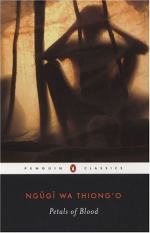|
This section contains 362 words (approx. 1 page at 400 words per page) |

|
Petals of Blood Summary & Study Guide Description
Petals of Blood Summary & Study Guide includes comprehensive information and analysis to help you understand the book. This study guide contains the following sections:
This detailed literature summary also contains Bibliography and a Free Quiz on Petals of Blood by Ngũgĩ wa Thiong'o.
Petals of Blood is the fourth novel written by Ngugi wa Thiong'o, who is more commonly known simply as Ngugi. The novel describes the inequality, hypocrisy, and betrayal of peasants and workers in post-independence Kenya. As with Ngugi's other works, many of the events depicted in the novel have their basis in historical and social fact. The work is a damning indictment of the corruption and greed of Kenya's political, economic, and social elite who, after the struggle for freedom from British rule, have not returned the wealth of the land to its people but rather perpetuate the social injustice and economic inequality that were a feature of colonial oppression. In addition to criticizing this neocolonialism, the novel is also a bitter critique of the economic system of capitalism and its destructive, alienating effects on traditional Kenyan society.
The deeply political novel takes the form of a detective story. Three prominent industrialists in the town of Ilmorog in north-central Kenya have been murdered, and four suspects are questioned by the police. These four are the protagonists of the novel, whose interrelated stories are recounted against the background of Kenya's past and present. The shifting perspectives and timeline of the novel reinforce the sense of dislocation and disorientation of the once proud community of villagers who now struggle against the indignities of the neocolonial world.
The publication of Petals of Blood disturbed many of Kenya's leaders when it appeared in 1977, but the government did not formally denounce the novel. However, less than a year after it appeared Ngugi was imprisoned for his play I Will Marry When I Want. That work makes even more explicit the comparison between post-independence Kenyan leaders and British rulers.
Some commentators have faulted Ngugi for the novel's heavy-handed treatment of its message, the intrusive authorial voice, and the outdated socialist solution he offers for his country's ills. However, critics agree that Petals of Blood is an important contribution to world literature. Its admirers view it as an ambitious work that presents with artistic integrity Ngugi's statement of his social and political philosophy, and find it to be a realistic portrayal of the postcolonial experience in Kenya.
Read more from the Study Guide
|
This section contains 362 words (approx. 1 page at 400 words per page) |

|



